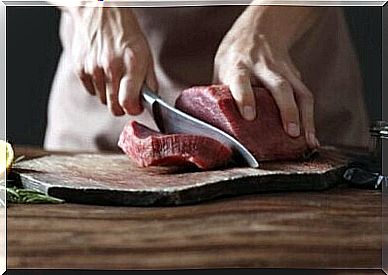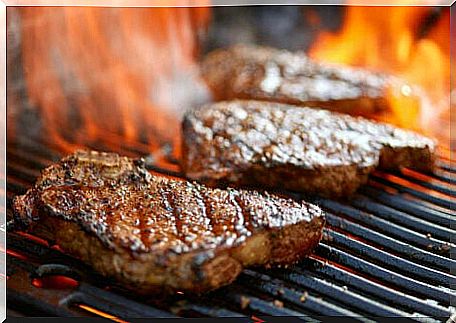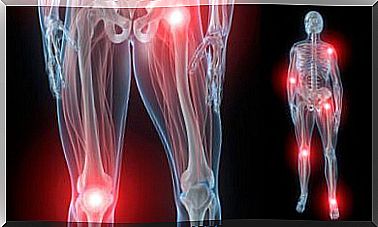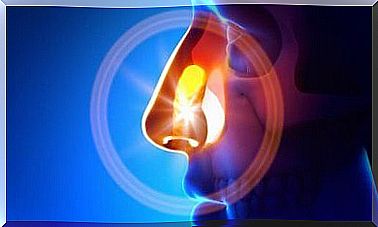What Is The Carnivorous Diet?
We are going to explain what the carnivorous diet is and what are its risks and application frameworks so that you can assess whether it is worth following it. Always have reservations about restrictive nutritional plans.

In this article, we will explain to you what the carnivorous diet consists of. This method of feeding is more and more fashionable today.
Many people claim that they experience the benefits of improved health from its establishment. However, as we will see, this diet is not necessarily supported by scientific evidence.
The extremely restrictive carnivorous diet
The main problem with restrictive-type diets is that they cause a great impact on the population due to the extensive propaganda work behind it. Some of them, like the vegan diet, have an ethical component that motivates many people to adopt it, in addition to the promises when it comes to weight loss.
The carnivorous diet is not left out and, in its particular case, it is a method of eating opposed to veganism. It consists of consuming only food from terrestrial animals.
In fact, the more stringent versions are to eat only red meat and drink water. Nothing more. This is a very restrictive protocol that removes foods from the plant kingdom and fish. However, this can promote the appearance of nutritional deficiencies.
The requirement for macro-nutrients, apart from carbohydrates, can be met through the consumption of meat. However, micronutrients are prone to deficiency when there is no variety.
We thus see that consuming only meat deprives us of phytonutrients in our intakes. These are essential substances with an antioxidant and anti-inflammatory character that play a key role in the promotion of health.
Scientific literature defends the need to incorporate these nutrients in the diet on a regular basis to fight against the onset of chronic diseases. They have been shown to reduce the risk of degenerative pathologies linked to aging.
The removal of antioxidants is able to increase the risk of developing diseases. These nutrients are also important for physical exercise. They reduce muscle pain and promote recovery.

Arguments to defend the carnivorous diet
Defenders of the carnivorous diet make the argument that red meat and viscera are nutrient dense foods. They would provide all the substances that the body needs. The consumption of carbohydrates, according to them, would be harmful and would cause disorders.
While it is true that simple sugars increase the incidence of metabolic disease, according to a study published in the journal Critical Reviews in Clinical Laboratory Sciences , ingestion of complex carbohydrates may often be necessary. This is the case, for example, when it is necessary to carry out activities which require a very intense anaerobic effort.
Another of the arguments that support the establishment of a carnivorous diet is that those who have tested it say they have much less gastrointestinal problems and bloating. This is because it is a low fiber diet plan.
Either way, fiber is essential for health and intestinal peristalsis. It is true that people who have an intestinal bacterial overgrowth should reduce this intake. However, this is only a one-off case.
It is known that large doses of fiber could increase the growth of pathogenic bacteria, thus producing bad sensations, through a disorder called SIBO by experts. For this clinical setting, temporarily reducing fiber consumption could be a solution. However, it is not advisable to suspend it forever.
Is the carnivorous diet viable?

While a short-term application of the carnivorous diet might benefit patients with bacterial overgrowth syndrome, it is a type of diet that cannot be followed for a long time. The short and medium term effects quickly become evident.
Ketogenic diets, which are also restrictive, have been studied and rated as safe, according to research published in the World Journal of Pediatrics . However, the carnivorous diet goes much further.
Restricting phytonutrients can lead to serious health problems. And this if we put aside the little grip that such a diet can present. It only allows you to consume a small spectrum of foods.
This is why international opinion advises against the application of this so restrictive regime, in any of its variants. Reducing carbohydrate intake may be recommended for many people, but temporarily and as part of a varied plan rich in fish and foods from the plant world.
The recommendation is to always avoid restrictive diets
Restrictive diets promise quick results in weight loss and improved health. Certain ethical components are sometimes added to it.
However, the restriction implies a limitation in the intake of nutrients. This can lead to deficiencies in the medium and long term. It is for this reason that we must avoid this type of extreme shots. The best is to choose a varied and balanced diet from a caloric point of view. If you have any further doubts about this, do not hesitate to consult a nutritional professional.









